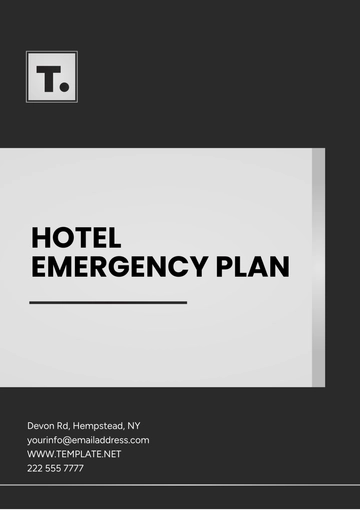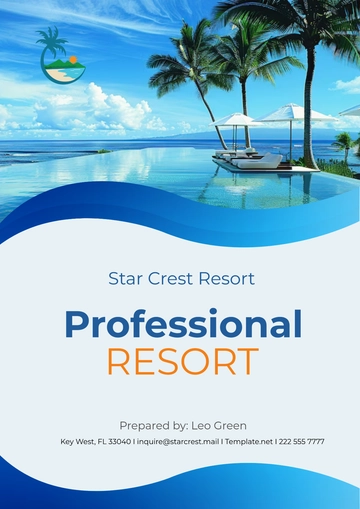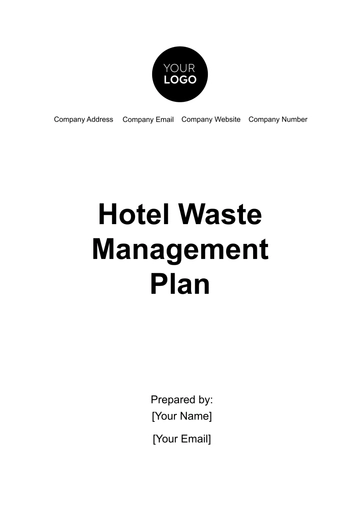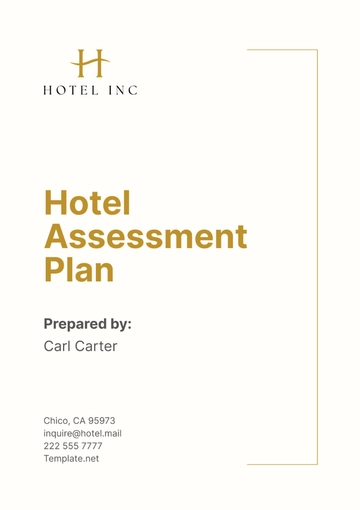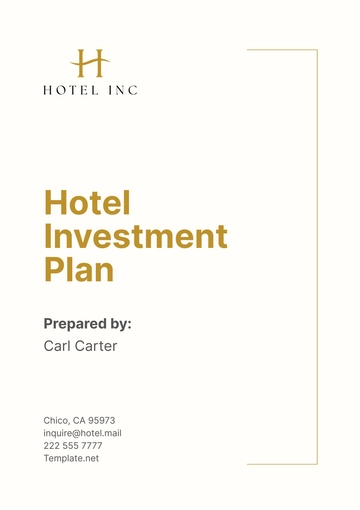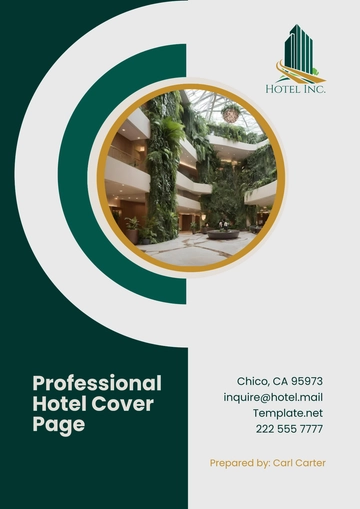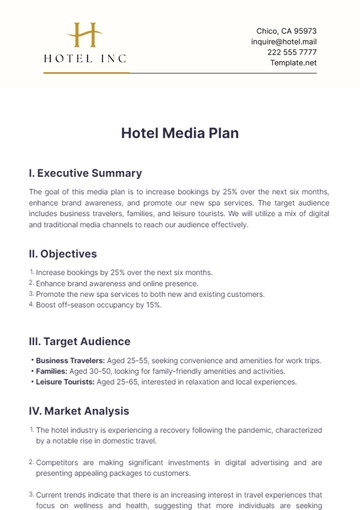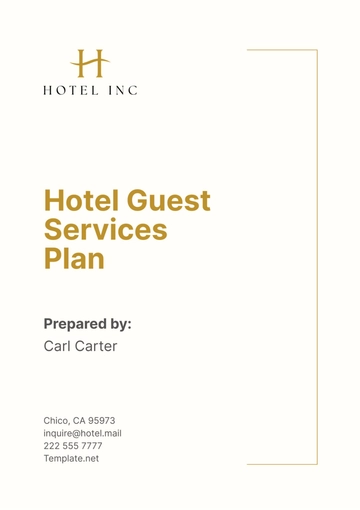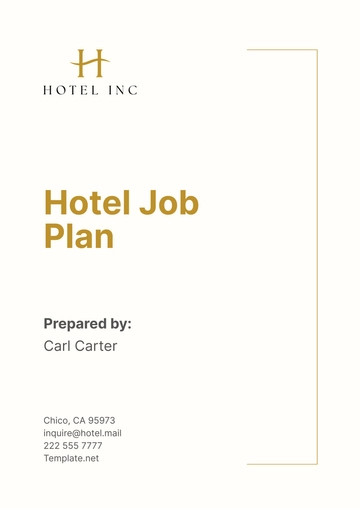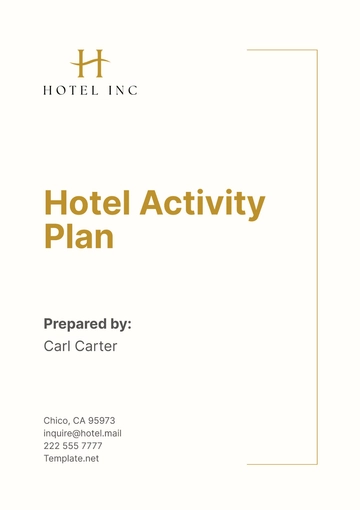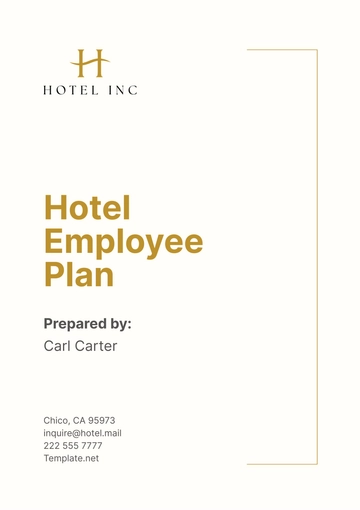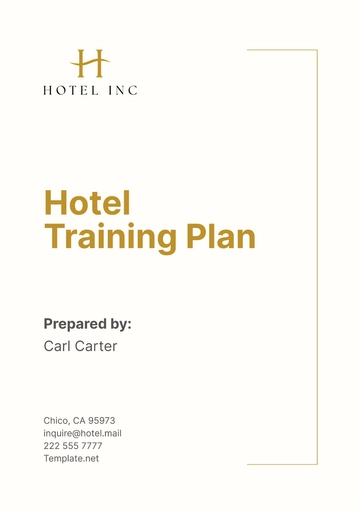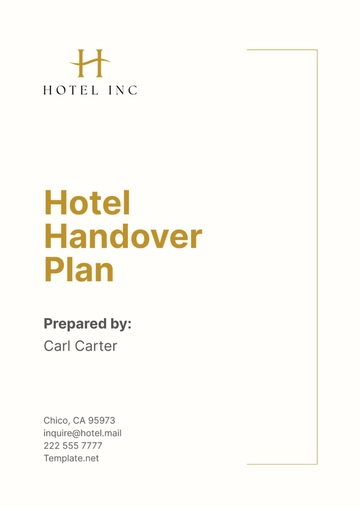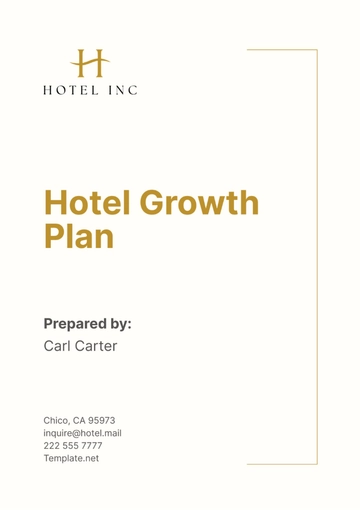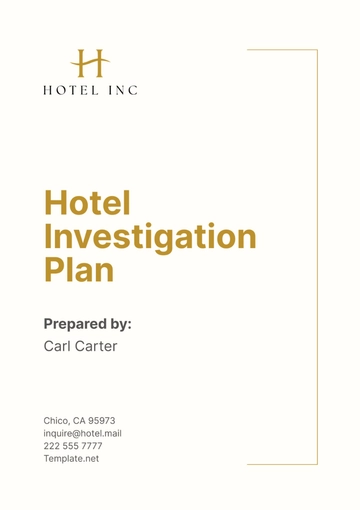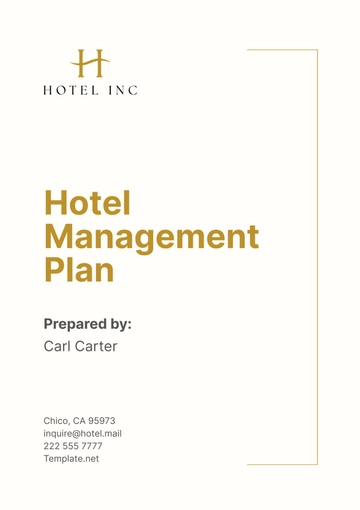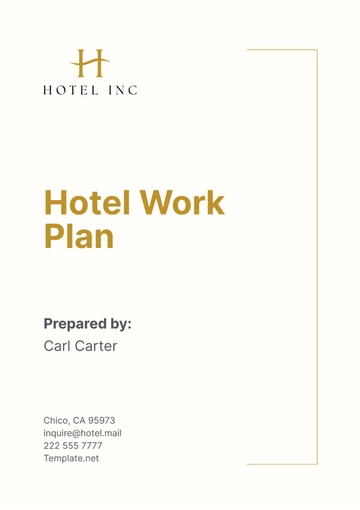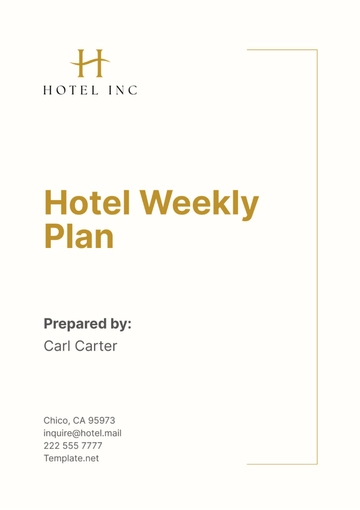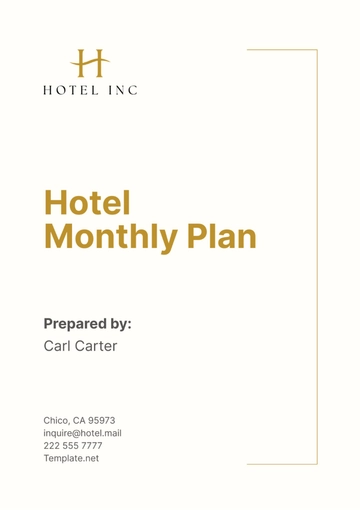Free Hotel Activity Plan
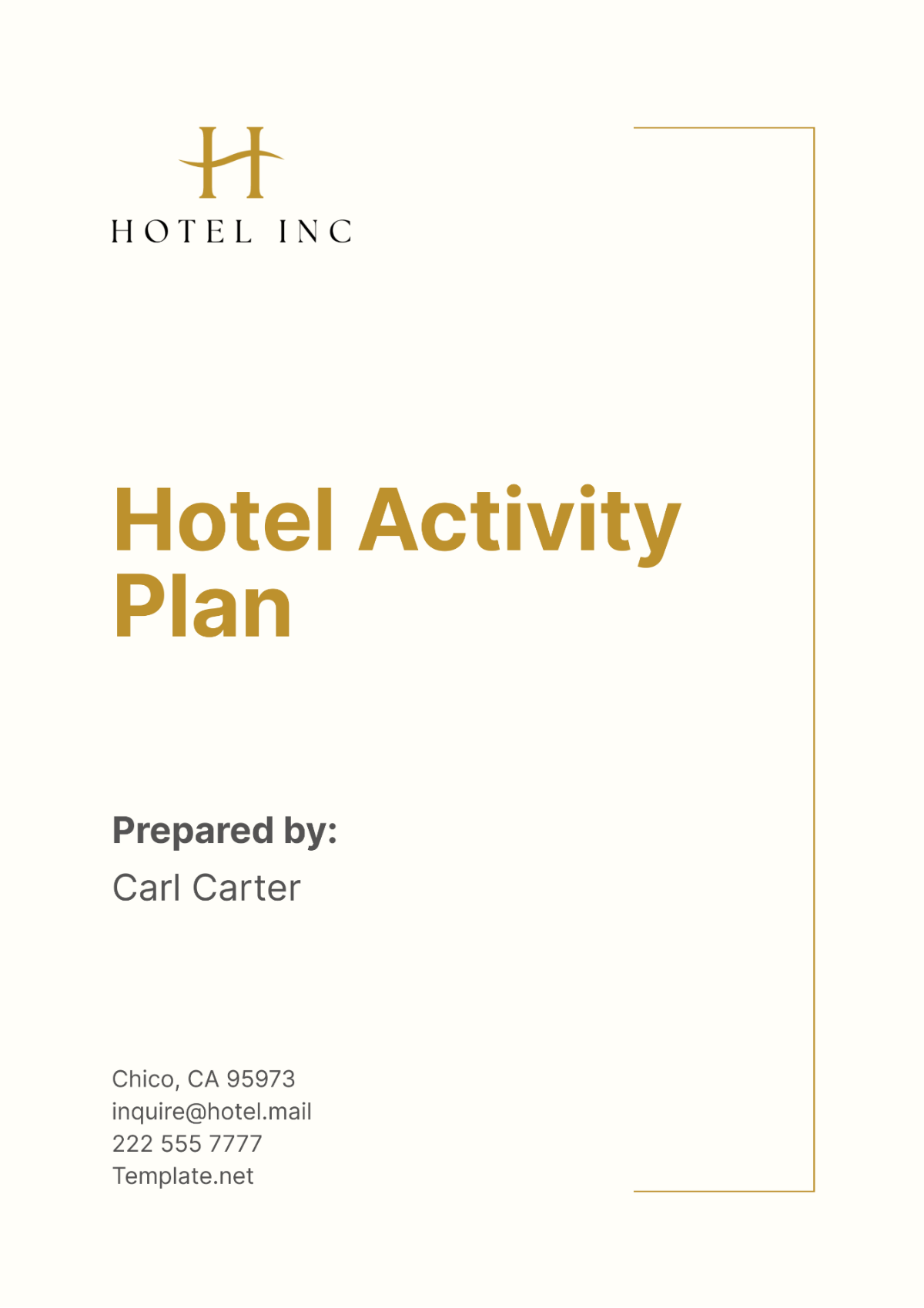
I. Executive Summary
The Activity Plan for [Your Company Name] aims to enhance guest experiences and satisfaction through a diverse range of activities. This plan integrates recreational, cultural, wellness, and children's activities to cater to various guest preferences, creating a unique and engaging environment. By implementing this comprehensive plan, we strive to differentiate our hotel from competitors and offer a memorable stay for all guests.
The total budget for the implementation of the Activity Plan is $35,000. This includes initial investments in equipment and staffing, as well as monthly maintenance costs. The financial projections indicate an expected monthly revenue of $55,000 from these activities, highlighting the potential for significant financial returns.
This plan outlines the various activities, delineates the schedules, specifies the allocations of resources, and describes the expected outcomes. It intends to offer clear and actionable insights, to ensure that all staff members are fully equipped to effectively implement the plan.
II. Activity Overview
A. Recreational Activities
Swimming Pool Games: Organized daily from 10 AM to 12 PM, including activities like water polo, relay races, and diving contests. These activities are aimed at enhancing guest interaction and enjoyment by providing fun, competitive, and refreshing experiences.
Beach Volleyball: Available every afternoon from 3 PM to 5 PM at the hotel's private beach. Guests can participate in friendly matches, fostering a sense of community and physical wellness.
Outdoor Yoga Classes: Held every morning at sunrise and evening at sunset on the hotel's lawn. These sessions aim to promote relaxation, physical health, and mental well-being.
Guided Nature Walks: Scheduled twice a day, in the morning and late afternoon, allowing guests to explore the local flora and fauna with expert guides. These walks provide educational and immersive experiences in nature.
Mini Golf Tournaments: Conducted every weekend, offering a fun and competitive activity for families and groups. Winners receive small prizes, encouraging participation and excitement.
B. Cultural Activities
Local Cuisine Cooking Classes: Held twice a week, teaching guests how to prepare traditional dishes. These classes provide a hands-on cultural experience, allowing guests to take a piece of the local culture home with them.
Traditional Dance Performances: Scheduled every Friday evening, showcasing local dance forms and music. These performances aim to entertain and educate guests about the local culture and traditions.
Artisan Craft Workshops: Organized weekly, where guests can learn and create traditional crafts. These workshops offer a creative and educational activity, promoting cultural appreciation and hands-on learning.
Local History Tours: Available three times a week, guiding guests through significant historical sites and landmarks in the area. These tours provide a rich historical context and deeper understanding of the local heritage.
C. Wellness Activities
Spa Services: Offering a variety of treatments including massages, facials, and body wraps. These services are available daily, providing guests with relaxation and rejuvenation.
Fitness Classes: Scheduled throughout the week, including pilates, spinning, and HIIT sessions. These classes cater to different fitness levels and preferences, promoting health and wellness.
Meditation Sessions: Conducted twice daily, focusing on mindfulness and stress relief. These sessions aim to improve mental well-being and provide tools for guests to manage stress.
Nutritional Workshops: Held monthly, providing insights into healthy eating habits and nutrition. These workshops offer valuable information and practical tips for maintaining a healthy lifestyle.
Hydrotherapy Treatments: Available in the hotel's spa, including hot and cold water therapies to improve circulation and promote relaxation.
D. Children's Activities
Kids Club: Open daily with supervised activities including arts and crafts, storytelling, and educational games. The Kids Club provides a safe and fun environment for children, allowing parents to relax and enjoy their stay.
Treasure Hunts: Organized weekly, engaging children in adventurous and imaginative activities around the hotel premises. These hunts encourage teamwork and creativity.
Mini Sports Competitions: Held every weekend, including events like sack races, tug-of-war, and mini football. These competitions promote physical activity and friendly competition among children.
Movie Nights: Scheduled every evening with family-friendly films. This activity provides entertainment and relaxation for children and families alike.
Interactive Storytelling Sessions: Conducted daily, allowing children to engage with stories through interactive and participatory methods. These sessions enhance creativity and listening skills.
Educational Workshops: Offered weekly, covering topics like environmental awareness, basic science experiments, and cultural education. These workshops provide learning opportunities in a fun and engaging manner.
III. Resource Allocation
The following chart and table outline the resources required for the successful implementation of the hotel activities, including staffing, equipment, and budget allocations:
Activity Category | Staffing Requirements | Equipment Needed | Budget Allocation |
|---|---|---|---|
Recreational Activities | 5 Activity Coordinators | Sports equipment, yoga mats | $10,000 |
Cultural Activities | 3 Cultural Experts | Cooking utensils, craft materials | $8,000 |
Wellness Activities | 4 Wellness Instructors | Spa products, fitness equipment | $12,000 |
Children's Activities | 6 Childcare Staff | Toys, educational materials | $5,000 |
Total | $35,000 |
A. Recreational Activities
Recreational activities require a team of five coordinators who will be responsible for organizing and managing daily games and sports events. Equipment such as sports gear, yoga mats, and pool accessories will be essential. The allocated budget of $10,000 covers the procurement of these items and maintenance costs.
The role of the coordinators is to ensure that activities are conducted safely and smoothly, engaging guests and encouraging participation. Regular maintenance of equipment is crucial to ensure safety and longevity. The budget also includes provisions for occasional replacement of worn-out items and the introduction of new games and activities.
Recreational activities play a vital role in enhancing guest experiences by providing fun, physical exercise, and opportunities for social interaction. They are essential for differentiating our hotel and creating lasting memories for our guests.
B. Cultural Activities
Cultural activities require three experts knowledgeable in local traditions and customs to lead cooking classes, dance performances, and craft workshops. The budget allocation of $8,000 covers the purchase of necessary cooking utensils, materials for crafts, and costumes for performances.
These activities aim to provide guests with authentic cultural experiences, enriching their stay and promoting cultural understanding. The budget also includes provisions for guest participation materials, such as ingredients for cooking classes and supplies for craft workshops.
By offering cultural activities, we can attract guests interested in cultural immersion and education, enhancing our hotel's appeal and reputation as a culturally rich destination.
C. Wellness Activities
Wellness activities necessitate four instructors specializing in different fitness and wellness disciplines. The $12,000 budget allocation covers spa products, fitness equipment, and materials for meditation and nutritional workshops.
The wellness program focuses on promoting physical and mental well-being, offering guests a variety of options to improve their health. The budget also includes maintenance and replacement costs for fitness equipment and spa products to ensure a high-quality experience.
Wellness activities are crucial for attracting health-conscious guests and providing added value to their stay. These activities enhance guest satisfaction and contribute to our hotel's reputation as a wellness destination.
D. Children's Activities
Children's activities require six dedicated childcare staff members to supervise and engage children in various activities. The $5,000 budget covers toys, educational materials, and equipment for games and storytelling sessions.
These activities are designed to provide a safe, fun, and educational environment for children, allowing parents to relax and enjoy their stay. The budget also includes provisions for maintaining and updating the play materials and introducing new activities.
Children's activities are essential for attracting families to our hotel, offering a comprehensive experience that caters to all age groups. This enhances our hotel's family-friendly reputation and increases guest satisfaction.
IV. Scheduling and Timelines
A. Daily Activities
Morning Activities: Including yoga classes, nature walks, and fitness sessions from 6 AM to 9 AM. These activities are designed to start the day with physical activity and relaxation.
Midday Activities: Such as swimming pool games and cooking classes from 10 AM to 12 PM. These activities provide entertainment and educational experiences during the late morning.
Afternoon Activities: Featuring beach volleyball, guided tours, and fitness classes from 3 PM to 5 PM. These activities aim to keep guests engaged and active in the afternoon.
Evening Activities: Including traditional dance performances, movie nights, and meditation sessions from 6 PM to 9 PM. These activities offer entertainment and relaxation in the evening.
Night Activities: Such as stargazing sessions and interactive storytelling from 9 PM onwards. These activities provide a relaxing end to the day and cater to night owls.
B. Weekly Activities
Weekend Tournaments: Including mini golf competitions and mini sports events every Saturday and Sunday. These activities encourage guest interaction and friendly competition.
Cultural Events: Such as local cuisine cooking classes and traditional dance performances every Friday. These events provide cultural enrichment and entertainment.
Wellness Workshops: Featuring nutritional and meditation workshops every Wednesday. These workshops offer valuable health and wellness information.
Educational Tours: Including local history tours and environmental workshops every Tuesday and Thursday. These tours provide educational and immersive experiences.
V. Guest Feedback and Improvement
A. Feedback Mechanisms
Guest Surveys: Distributed at check-out to gather feedback on activity participation and satisfaction. These surveys provide valuable insights into guest preferences and areas for improvement.
Online Reviews: Monitored regularly to identify trends and common feedback related to hotel activities. Online reviews offer a broader perspective on guest experiences and expectations.
Staff Observations: Collected and reported by activity coordinators to highlight any issues or successes. Staff observations provide on-the-ground insights into activity execution and guest engagement.
Suggestion Boxes: Placed in common areas for guests to provide anonymous feedback. Suggestion boxes encourage open and honest feedback from guests.
B. Continuous Improvement
Activity Adjustments: Based on guest feedback and participation rates, activities are adjusted to better meet guest preferences. Regular reviews ensure activities remain relevant and engaging.
Staff Training: Ongoing training programs for activity coordinators to enhance their skills and improve guest interactions. Well-trained staff contribute to the success of activities and guest satisfaction.
Resource Allocation: Adjustments to resource allocations based on activity success and guest feedback. Ensuring adequate resources are available for popular activities enhances guest experiences.
New Activity Introduction: Regularly introducing new activities to keep the program fresh and exciting. New activities attract repeat guests and enhance the hotel's appeal.
VI. Marketing and Promotion
A. Marketing Strategies
Social Media Campaigns: Highlighting upcoming activities and guest experiences. Social media provides a platform to reach a wide audience and engage with potential guests.
Email Newsletters: Informing past and potential guests about new and upcoming activities. Newsletters keep guests informed and encourage repeat visits.
In-House Promotions: Using flyers, posters, and digital screens within the hotel to promote daily and weekly activities. In-house promotions ensure guests are aware of the activities available during their stay.
Partnerships with Local Businesses: Collaborating with local tour operators, restaurants, and cultural centers to promote activities. Partnerships expand the hotel's reach and offer guests a more comprehensive experience.
B. Promotional Offers
Discounted Packages: Offering activity bundles at discounted rates to encourage participation. Packages provide value for guests and increase activity engagement.
Loyalty Programs: Rewarding repeat guests with exclusive access to certain activities or discounts. Loyalty programs enhance guest retention and satisfaction.
Seasonal Promotions: Special promotions during peak seasons to attract more guests. Seasonal promotions capitalize on high demand periods to maximize participation.
Referral Incentives: Encouraging guests to refer friends and family with special discounts or rewards. Referral incentives expand the hotel's guest base and increase activity participation.
VII. Financial Projections
The following chart and table provide the financial projection for the Activity Plan, including expected costs and revenue:
Activity Category | Initial Investment | Monthly Maintenance Costs | Expected Revenue |
|---|---|---|---|
Recreational Activities | $10,000 | $2,000 | $15,000 |
Cultural Activities | $8,000 | $1,500 | $12,000 |
Wellness Activities | $12,000 | $3,000 | $18,000 |
Children's Activities | $5,000 | $1,000 | $10,000 |
Total | $35,000 | $7,500 | $55,000 |
A. Initial Investment
The initial investment for each activity category covers the purchase of necessary equipment, staff hiring, and initial marketing efforts. Recreational activities require $10,000, cultural activities $8,000, wellness activities $12,000, and children's activities $5,000. These investments are crucial for setting up high-quality and engaging activities that attract and retain guests.
B. Monthly Maintenance Costs
Monthly maintenance costs include the upkeep of equipment, staff salaries, and ongoing marketing efforts. Recreational activities require $2,000, cultural activities $1,500, wellness activities $3,000, and children's activities $1,000. Regular maintenance ensures the smooth operation of activities and high guest satisfaction.
C. Expected Revenue
Expected revenue from each activity category is projected based on guest participation rates and pricing strategies. Recreational activities are expected to generate $15,000, cultural activities $12,000, wellness activities $18,000, and children's activities $10,000. These projections highlight the potential financial benefits of a well-implemented activity plan.
VIII. Risk Management
A. Potential Risks
Low Participation Rates: Risk of low guest engagement in activities, affecting overall success. Strategies to mitigate this risk include targeted marketing and regular adjustments based on guest feedback.
Resource Shortages: Insufficient staff or equipment could impact activity quality. Ensuring adequate resources and backup plans are essential for smooth operations.
Safety Incidents: Potential for accidents or injuries during activities. Implementing strict safety protocols and staff training minimizes this risk.
Budget Overruns: Unexpected expenses could exceed budget allocations. Regular financial monitoring and flexible budgeting help manage this risk.
B. Mitigation Strategies
Enhanced Marketing: Increasing awareness and interest in activities through comprehensive marketing efforts. Targeting specific guest segments and highlighting unique selling points.
Resource Planning: Ensuring sufficient staff and equipment are available for all activities. Implementing a resource management plan to address potential shortages.
Safety Protocols: Developing and enforcing strict safety guidelines for all activities. Regular staff training and safety drills to ensure preparedness.
Financial Oversight: Regularly monitoring expenses and adjusting budgets as needed. Implementing financial controls to prevent overruns and ensure efficient use of resources.
IX. Conclusion and Next Steps
A. Conclusion
The Activity Plan for [Your Company Name] is designed to enhance guest experiences, promote engagement, and differentiate our hotel from competitors. By offering a diverse range of recreational, cultural, wellness, and children's activities, we aim to create memorable and enjoyable stays for our guests. This plan includes detailed scheduling, resource allocation, marketing strategies, and financial projections to ensure its successful implementation.
Guest feedback mechanisms and continuous improvement processes are integral to the plan, allowing us to adapt and refine activities based on guest preferences and feedback. By focusing on quality and variety, we can attract a broader audience and increase guest satisfaction, ultimately driving revenue and growth for our hotel.
B. Next Steps
Activity Launch: Initiate the activities as per the plan, ensuring all resources and staff are ready.
Marketing Campaign: Launch targeted marketing campaigns to promote the new activities to potential and returning guests.
Feedback Collection: Implement feedback mechanisms to gather guest input and make necessary adjustments.
Staff Training: Conduct training sessions for staff to ensure they are well-prepared to manage and execute activities.
Financial Monitoring: Regularly review financial performance to ensure activities are within budget and achieving expected revenue.
By following these steps, we can ensure the successful implementation of our Activity Plan, enhancing guest experiences and driving the growth and success of [Your Company Name].
- 100% Customizable, free editor
- Access 1 Million+ Templates, photo’s & graphics
- Download or share as a template
- Click and replace photos, graphics, text, backgrounds
- Resize, crop, AI write & more
- Access advanced editor
Plan engaging activities and events for guests using the Hotel Activity Plan Template from Template.net! This editable resource provides a structured framework for recreational activities, entertainment, and special events. The template is customizable, allowing adaptation to reflect your hotel's offerings and brand identity. Generate effortlessly using the AI Editor Tool!
You may also like
- Finance Plan
- Construction Plan
- Sales Plan
- Development Plan
- Career Plan
- Budget Plan
- HR Plan
- Education Plan
- Transition Plan
- Work Plan
- Training Plan
- Communication Plan
- Operation Plan
- Health And Safety Plan
- Strategy Plan
- Professional Development Plan
- Advertising Plan
- Risk Management Plan
- Restaurant Plan
- School Plan
- Nursing Home Patient Care Plan
- Nursing Care Plan
- Plan Event
- Startup Plan
- Social Media Plan
- Staffing Plan
- Annual Plan
- Content Plan
- Payment Plan
- Implementation Plan
- Hotel Plan
- Workout Plan
- Accounting Plan
- Campaign Plan
- Essay Plan
- 30 60 90 Day Plan
- Research Plan
- Recruitment Plan
- 90 Day Plan
- Quarterly Plan
- Emergency Plan
- 5 Year Plan
- Gym Plan
- Personal Plan
- IT and Software Plan
- Treatment Plan
- Real Estate Plan
- Law Firm Plan
- Healthcare Plan
- Improvement Plan
- Media Plan
- 5 Year Business Plan
- Learning Plan
- Marketing Campaign Plan
- Travel Agency Plan
- Cleaning Services Plan
- Interior Design Plan
- Performance Plan
- PR Plan
- Birth Plan
- Life Plan
- SEO Plan
- Disaster Recovery Plan
- Continuity Plan
- Launch Plan
- Legal Plan
- Behavior Plan
- Performance Improvement Plan
- Salon Plan
- Security Plan
- Security Management Plan
- Employee Development Plan
- Quality Plan
- Service Improvement Plan
- Growth Plan
- Incident Response Plan
- Basketball Plan
- Emergency Action Plan
- Product Launch Plan
- Spa Plan
- Employee Training Plan
- Data Analysis Plan
- Employee Action Plan
- Territory Plan
- Audit Plan
- Classroom Plan
- Activity Plan
- Parenting Plan
- Care Plan
- Project Execution Plan
- Exercise Plan
- Internship Plan
- Software Development Plan
- Continuous Improvement Plan
- Leave Plan
- 90 Day Sales Plan
- Advertising Agency Plan
- Employee Transition Plan
- Smart Action Plan
- Workplace Safety Plan
- Behavior Change Plan
- Contingency Plan
- Continuity of Operations Plan
- Health Plan
- Quality Control Plan
- Self Plan
- Sports Development Plan
- Change Management Plan
- Ecommerce Plan
- Personal Financial Plan
- Process Improvement Plan
- 30-60-90 Day Sales Plan
- Crisis Management Plan
- Engagement Plan
- Execution Plan
- Pandemic Plan
- Quality Assurance Plan
- Service Continuity Plan
- Agile Project Plan
- Fundraising Plan
- Job Transition Plan
- Asset Maintenance Plan
- Maintenance Plan
- Software Test Plan
- Staff Training and Development Plan
- 3 Year Plan
- Brand Activation Plan
- Release Plan
- Resource Plan
- Risk Mitigation Plan
- Teacher Plan
- 30 60 90 Day Plan for New Manager
- Food Safety Plan
- Food Truck Plan
- Hiring Plan
- Quality Management Plan
- Wellness Plan
- Behavior Intervention Plan
- Bonus Plan
- Investment Plan
- Maternity Leave Plan
- Pandemic Response Plan
- Succession Planning
- Coaching Plan
- Configuration Management Plan
- Remote Work Plan
- Self Care Plan
- Teaching Plan
- 100-Day Plan
- HACCP Plan
- Student Plan
- Sustainability Plan
- 30 60 90 Day Plan for Interview
- Access Plan
- Site Specific Safety Plan
